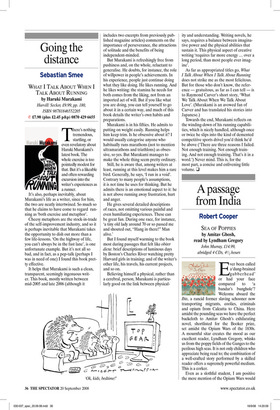Going the distance
Sebastian Smee
WHAT I TALK ABOUT WHEN I TALK ABOUT RUNNING by Haruki Murakami Harvill/ Secker, £9.99, pp. 180, ISBN 98781846552205 ✆ £7.90 (plus £2.45 p&p) 0870 429 6655 There’s nothing tremendous, startling, or even revelatory about Haruki Murakami’s latest book. The whole exercise is too pointedly modest for that. But it’s a likeable and often rewarding excursion into the writer’s experiences as a runner.
It’s also, perhaps inevitably, about Murakami’s life as a writer, since for him, the two are neatly intertwined. So much so that he claims to have come to regard running as ‘both exercise and metaphor’.
Cheesy metaphors are the stock-in-trade of the self-improvement industry, and so it is perhaps inevitable that Murakami takes the opportunity to dish out more than a few life-lessons. ‘On the highway of life, you can’t always be in the fast lane’, is one unfortunate example. But it’s not all so bad, and in fact, as a pep-talk (perhaps I was in need of one) I found this book pretty effective.
It helps that Murakami is such a clean, transparent, seemingly ingenuous writer. This book, mostly written between mid-2005 and late 2006 (although it includes two excerpts from previously published magazine articles) comments on the importance of perseverance, the attractions of solitude and the benefits of being independent-minded.
But Murakami is refreshingly free from pushiness and, on the whole, reluctant to generalise. He doubts, for instance, the role of willpower in people’s achievements. In his experience, people just continue doing what they like doing. He likes running. And he likes writing: the stamina he needs for both comes from the liking, not from an imported act of will. But if you like what you are doing, you can tell yourself to go about it in a certain way, and much of this book details the writer’s own habits and preparations.
Murakami is in his fifties. He admits to putting on weight easily. Running helps him keep trim. Is he obsessive about it? I would usually categorise anyone who habitually runs marathons (not to mention ultramarathons and triathlons) as obsessive, so yes. But Murakami manages to make the whole thing seem pretty ordinary.
Still, he is aware that, among writers at least, running at this level makes him a rare bird. Generally, he says, ‘I run in a void’. Contrary to many people’s assumptions, it is not time he uses for thinking. But he admits there is an emotional aspect to it: he is not above running away frustration, hurt and anger.
He gives several detailed descriptions of races, not omitting various painful and even humiliating experiences. These can be great fun. During one race, for instance, ‘a tiny old lady around 70 or so passed me and shouted out, “Hang in there!” Man alive.’ But I found myself warming to the book most during passages that felt like obiter dicta: brief descriptions of luminous days by Boston’s Charles River watching pretty Harvard girls in training; and of the writer’s other life, his travels, his current projects, and so on.
Believing himself a physical, rather than a cerebral, person, Murakami is particularly good on the link between physical ity and understanding. Writing novels, he says, requires a balance between imaginative power and the physical abilities that sustain it. This physical aspect of creative writing ‘requires far more energy ... over a long period, than most people ever imagine’.
As far as appropriated titles go, What I Talk About When I Talk About Running does not strike me as the most felicitous. But for those who don’t know, the reference — gratuitous, as far as I can tell — is to Raymond Carver’s short story, ‘What We Talk About When We Talk About Love’. (Murakami is an avowed fan of Carver and has translated his stories into Japanese.) Towards the end, Murakami reflects on the winding-down of his running capabilities, which is nicely handled, although once or twice he slips into the kind of demented competitive sports drivel you’d think he’d be above (‘There are three reasons I failed. Not enough training. Not enough training. And not enough training. That’s it in a word.’) Never mind. This is, for the most part, a concise and enlivening little volume. q










































































 Previous page
Previous page